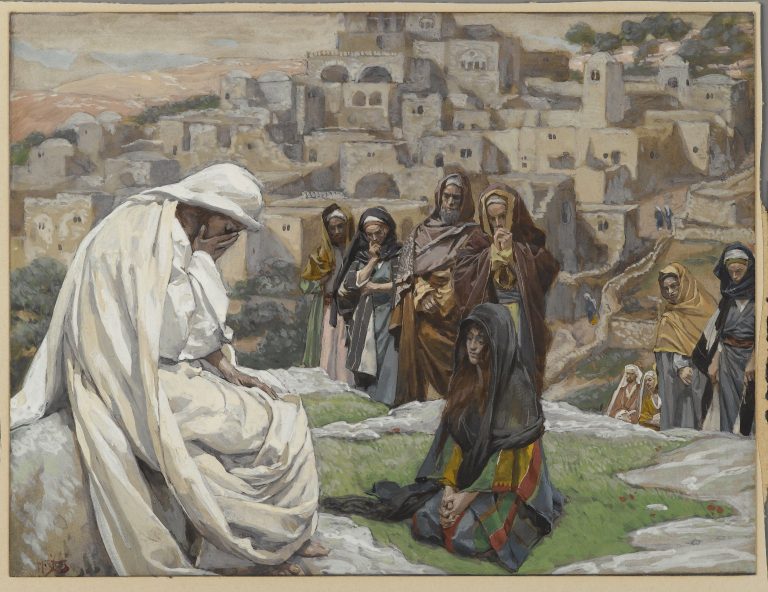Did Jesus Ever Laugh?
Laughter is one of the most universal expressions of joy and happiness. It’s a natural part of our lives, and we often associate it with positive experiences and emotions. But what about Jesus?
As the central figure of Christianity and the object of worship for billions of people, did he ever laugh? It’s a question that has intrigued scholars, theologians, and believers for centuries.
In this article, we’ll explore what we know about Jesus’ emotions, the theological and cultural perspectives on laughter, and whether or not there’s any evidence of Jesus’ laughter in the Bible.

What Do We Know About Jesus’ Life?
To answer the question of whether Jesus ever laughed, we need to understand the historical context and the religious and cultural practices of the time. Jesus was born in Bethlehem around 4 BC, and he grew up in Nazareth in Galilee, a region in northern Israel. He began his public ministry around the age of 30, and his teachings and actions attracted a large following of disciples and supporters.
Despite his popularity, Jesus’ life was not an easy one. He was born into a poor family and lived under Roman occupation, which meant that he and his fellow Jews faced discrimination, violence, and political oppression.
Jesus’ message of love, compassion and social justice challenged the established authorities and often put him in conflict with the religious and political leaders of his time. Eventually, he was arrested, tried, and executed by crucifixion, a common punishment for political dissidents in ancient Rome.
The Bible, especially the four Gospels (Matthew, Mark, Luke, and John), and other early Christian texts and non-Christian historical accounts are the most important sources for Jesus’ life. These sources give some information about what Jesus taught, what he did, and who he was, but they also show a complicated and sometimes contradictory picture.
Jesus’ Emotions in the Bible
One way to approach the question of Jesus’ laughter is to examine his emotions as they are presented in the Bible. The Gospels depict Jesus as a compassionate, empathetic, and often intense figure who experiences a wide range of emotions, from love and joy to anger and sorrow. He is described as weeping at the death of his friend Lazarus (John 11:35), feeling compassion for the crowds who follow him (Matthew 9:36), and expressing frustration and anger at the religious leaders who oppose him (Matthew 23:13-33).
However, the Bible does not mention laughter as one of Jesus’ emotions. Some scholars think that because Jesus’ laughter isn’t mentioned in the Gospels, he may not have laughed at all or that it just wasn’t written down.
Others have suggested that laughter was not considered an important aspect of Jesus’ personality or message, and therefore did not warrant mention in the texts.
Theological Perspectives on Jesus’ Laughter
From a theological perspective, the question of Jesus’ laughter raises interesting and complex issues about his humanity and divinity. Christians believe that Jesus was both fully human and fully divine, which means that he experienced all the emotions and physical sensations of a human being, while also possessing the divine nature of God.
Some theologians say that laughter is an important part of being human and that Jesus must have laughed, just like he must have felt joy, love, and sadness. They point to Jesus’ message of joy and celebration, such as his parable of the prodigal son, which emphasizes the importance of forgiveness and reconciliation (Luke 15:11–32).
They also note that laughter and humor can be powerful tools for building community, breaking down barriers, and promoting understanding and empathy.
Other theologians are more cautious about attributing specific emotions to Jesus. They argue that the Gospels present a limited and selective portrait of his life and teachings and that we should not assume that every aspect of his personality and experience is included in the texts.
They also point out that laughter and humor can be culturally specific and may not always translate well across time and place. What may have been considered funny or appropriate in Jesus’ day may not be the same as what we find humorous today.
Historical and Cultural Perspectives on Laughter
In ancient societies, including those in the Mediterranean world where Jesus lived, laughter was often associated with festivals, celebrations, and rituals. It was also used as a way to challenge authority and express dissent, particularly in the context of political or social upheaval.
However, not all types of humor were considered acceptable or appropriate. Many cultures had strict rules and taboos around what could be said or done in public, and violations of these norms could result in punishment or social exclusion.
In Jewish and Christian traditions, laughter has had a more complex and ambivalent role. On the one hand, there are many examples of joy, celebration, and humor in the Bible, particularly in the context of festivals and other communal events.
The book of Ecclesiastes, for example, describes laughter as a gift from God and a source of pleasure (Ecclesiastes 3:4). The Psalms also contain many expressions of joy and gratitude, such as Psalm 126:2-3, which says, “Then our mouth was filled with laughter, and our tongue with shouts of joy; then they said among the nations, ‘The Lord has done great things for them.'”
To understand the role of laughter in Jesus’ life and times, we need to look at the broader historical and cultural context. Laughter has been a part of the human experience for thousands of years, and different societies and cultures have developed their own traditions and practices around humor.
On the other hand, there are also passages in the Bible that caution against excessive laughter or frivolity. The book of Proverbs, for example, warns against the dangers of foolishness and folly, which can lead to ruin and destruction.
Jesus himself is portrayed as a serious and focused figure, who is often preoccupied with the weighty matters of faith and justice. His message of repentance and salvation is not typically associated with humor or levity.
Examples of Humor and Laughter in the Bible
Despite the relative scarcity of references to laughter in the Gospels, there are some examples of humor and lightheartedness in the Bible. These passages can help us to understand the role of laughter in Jesus’ life and message, and to appreciate the diversity of emotions and experiences that are part of the human condition.
One example of humor in the Bible is the story of the rich young ruler, who comes to Jesus seeking guidance on how to inherit eternal life (Mark 10:17-31). Jesus tells him to sell all his possessions and give the money to the poor, but the young man is unable to do so.
Jesus then quips, “It is easier for a camel to go through the eye of a needle than for a rich person to enter the kingdom of God” (Mark 10:25), a humorous image that underscores the difficulty of achieving salvation.
Another example of joy and celebration in the Bible is the story of the wedding feast at Cana, where Jesus performs his first miracle by turning water into wine (John 2:1-12). The guests are amazed by the quality of the wine, and the host remarks that he has saved the best wine for last. This story emphasizes the abundance and generosity of God
Another example of humor and wit in the Gospels is the story of the Pharisees trying to trap Jesus by asking him whether it is lawful to pay taxes to Caesar (Mark 12:13-17). Jesus famously replies, “Render to Caesar the things that are Caesar’s and to God the things that are God’s,” a statement that not only deftly avoids the trap, but also highlights the importance of balancing civic duties and religious obligations.
Some scholars also argue that Jesus’ use of parables and metaphorical language may have contained elements of humor and irony. For example, the parable of the prodigal son, which tells the story of a wayward son who returns home to his father and is welcomed back with open arms, may have had humorous undertones.
The father’s extravagant forgiveness and celebration of his son’s return could be seen as a playful subversion of traditional family roles and expectations.
Conclusion – Did Jesus Ever Laugh
In conclusion, the question of whether Jesus ever laughed is one that is difficult to answer definitively. The Gospels do not provide clear evidence of Jesus laughing or making jokes, but this does not necessarily mean that he did not experience or express humor in his life and teachings.
Understanding the cultural and historical context of laughter, as well as the nuances of language and translation, can help us to appreciate the complexity and richness of the biblical text.
Regardless of whether Jesus himself was a jovial or serious figure, there is no doubt that laughter and joy have played an important role in Christian tradition and practice. From the exuberant celebrations of Mardi Gras and Carnivale to the raucous joy of gospel music and spirituals, Christians have found many ways to express their faith through laughter and song.
As we continue to explore the relationship between faith and humor, it is worth remembering the words of the apostle Paul, who wrote in his letter to the Romans, “Rejoice with those who rejoice, weep with those who weep” (Romans 12:15). Whether we find ourselves laughing or crying, celebrating or mourning, we are called to share in the full range of human emotions and experiences and to support one another with empathy, compassion, and love.

Sangtea Hmar is a passionate leader of the Youth Christian Fellowship at the Electric Vengthlang Presbyterian Church in Aizawl, Mizoram, India. He is the owner of Christiantone.com and is committed to spreading the word of God. He loves to mentor youth and help them grow in their faith.






